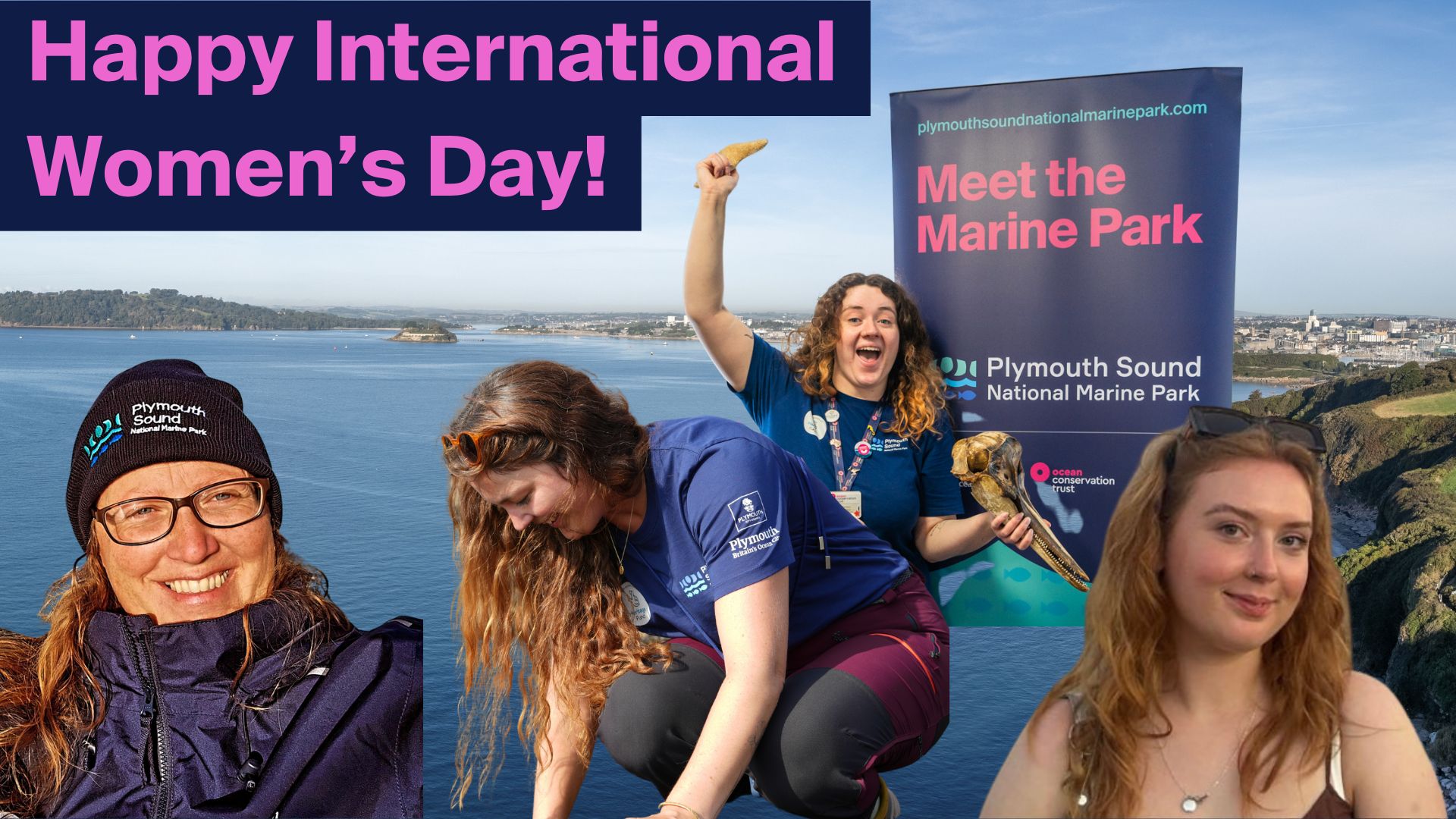As we celebrate International Women’s Day, Plymouth Sound National Marine Park is proud to highlight the incredible women who inspire and educate our community about the importance of marine conservation. These dedicated individuals are at the forefront of our public engagement efforts, empowering people to care for and take action to protect our unique marine environment. Through their passion and expertise, they foster a deeper connection between our community and the sea, encouraging everyone to become active stewards of our National Marine Park. Without further ado, meet our (non-exhaustive) team of inspiring female members!
Jess Stevens , PSNMP Coastal Ranger
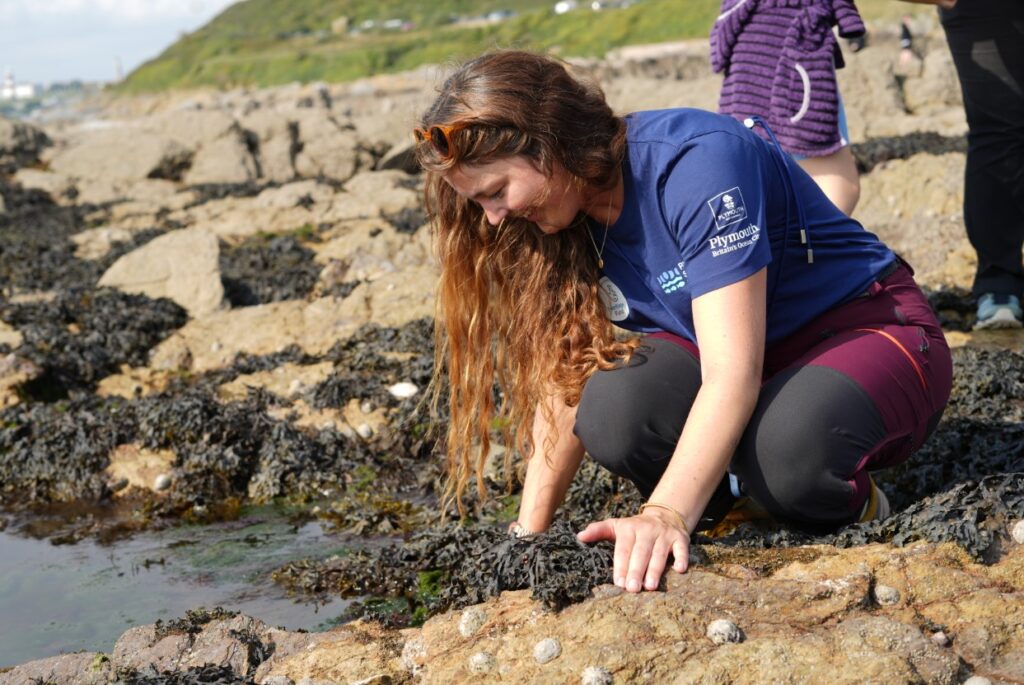
In my experience, having worked in various roles within conservation for over a decade, from animal rehabilitation and release, primate sanctuaries and now marine conservation, it has always been a female dominated space, especially within the animal rescue / rehab domain. Which is really fantastic and motivating, especially with so many women in management positions, which isn’t always the case in other industries. Within the NMP itself we have so many incredibly knowledgeable and passionate female leadership roles which I honestly find awe-inspiring and many have become role models to me!
I left behind the thick jungle canopy of my previous job working with primates, and transitioned to ocean conservation because my intermittent home was near Plymouth Sound National Marine Park and the ocean became such an important part of my community, my identity and my wellbeing. I can’t ever imagine living away from the big blue and I know a lot of people feel the same, so I wanted to help others connect, access and understand more about the ocean, why it’s so important and special, so that all the people yet to live by the sea will have the chance to love it too.
I know the ocean feels like it’s so far away from our everyday lives, it’s not like a tree that is noticeable when it’s gone, but there is an abundance of life in and around that water and it keeps us alive. Over half of our oxygen comes from phytoplankton in the sea, so when you breathe, try to imagine all that underwater life that’s gifted you yours. Whilst it terrifies me that our climate is rapidly changing, having an enormous impact on our oceans, I am also in amazement of all the incredible projects and organisations that are working to help ensure the ocean thrives and that people thrive with it. Plymouth is a hub of ocean conservation activity, and you are a part of that too, there are so many citizen science projects that you can be involved in and be a part of the conservation movement too, we are not powerless, together we can protect the blue space we all call home.
Emily Angell, PSNMP Engagement Coordinator
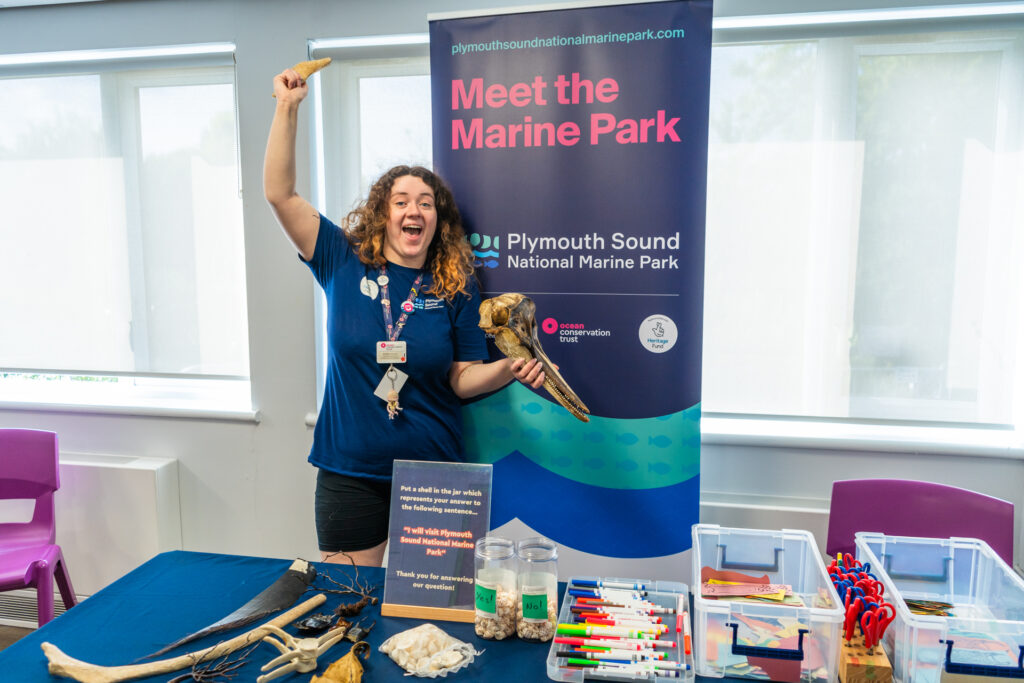
What inspired you to pursue a career in marine science/conservation?
When I was a child, I was obsessed with the Little Mermaid, and wanted to be a mermaid myself! Getting to live in the Ocean and be friends with all the sea creatures sounded like a pretty ideal life to me. At one point, someone told me that if I liked the Ocean so much, maybe I could be a marine biologist when I was older. This then influenced all my choices along my academic journey, leading me to choose to study Ocean Science & Marine Conservation at the University of Plymouth. Since then, I have been dressed as a mermaid multiple times, teaching children about our Ocean, so my job has literally been a dream come true!
Is there a particular moment or project that reaffirmed your passion for the ocean?
My first job with the Ocean Conservation Trust was being a Level 1 Ranger- this meant doing 1:1 engagement, workshops, shows and tours for the public visiting the National Marine Aquarium. It was the end of my first day and I had spent at least half an hour chatting to a little girl about starfish. At the end of our talk, she told me that when she grew up she wanted to be like me, and teach people all about starfish- this was a very impactful moment for me, especially as the National Marine Aquarium was somewhere I loved to visit to learn about the Ocean at this girl’s age. This inspired me to continue the cycle and inspire the next generation of Ocean enthusiasts.
What advice would you give to young women looking to enter this field?
Be open to different opportunities in marine science/conservation! As amazing as it is, marine conservation is rarely scuba diving with dolphins or helping baby turtles hatch. Working in marine science/conservation can also be sitting in an office coding, dissecting a sprat, or running an Ocean-themed toddler club! Whatever it is, your work is important and impactful. You do not have to give up your other interests to be involved in marine conservation- it is surprising how much being a theatre kid has helped me in my career!
Have you had any female role models or mentors who influenced your journey?
My Mum has always been my mentor- from SATs to my Masters degree, she has always supported my academic journey and celebrated my wins with me. Being a woman in STEM often means facing adversity and working twice as hard as male colleagues to get where you want to, and my Mum has always taught me to stand up for myself, keep going, and be that voice for change. I feel that these mantras often reflect in my conservation education work too, as it is often a very overlooked and undervalued sector in the scientific field. My Mum also got a job in a harbour the same time I got my first marine conservation job, so it’s pretty cool that we now both work in marine based jobs!
What are the biggest challenges facing marine science/conservation today?
Social media is such a massive part of everyone’s daily lives- for better and for worse! Information is so easily accessible over the internet now, but it is also so much easier for misinformation to spread. Think of ‘Stingray Jesus’- a female stingray in an American aquarium who was pregnant, despite living with no male stingrays. This is a reasonably common phenomenon amongst stingrays called parthenogenesis (asexual reproduction), but everyone chose to believe she had mated with a shark, or it was a second coming! It is important that people approach scientific hot topics in the mindset of a scientist- question everything, and if you don’t know, do some research yourself!
What excites you most about the future of marine conservation?
Marine conservation is beginning to take such a multi-faceted approach now. I work in the education & engagement sector, and it is amazing to see that it does just focus on just teaching through biology. I have seen some amazing education and engagement efforts through artistic and psychological approaches. I love the advancements in making marine conservation accessible and inclusive, from both improving access to marine science education, and to developing access to working in the field itself. The Ocean affects and influences all of us, so we can only truly help it if everyone has a seat at the table.
Jes Hirons, PSNMP Coastal Ranger
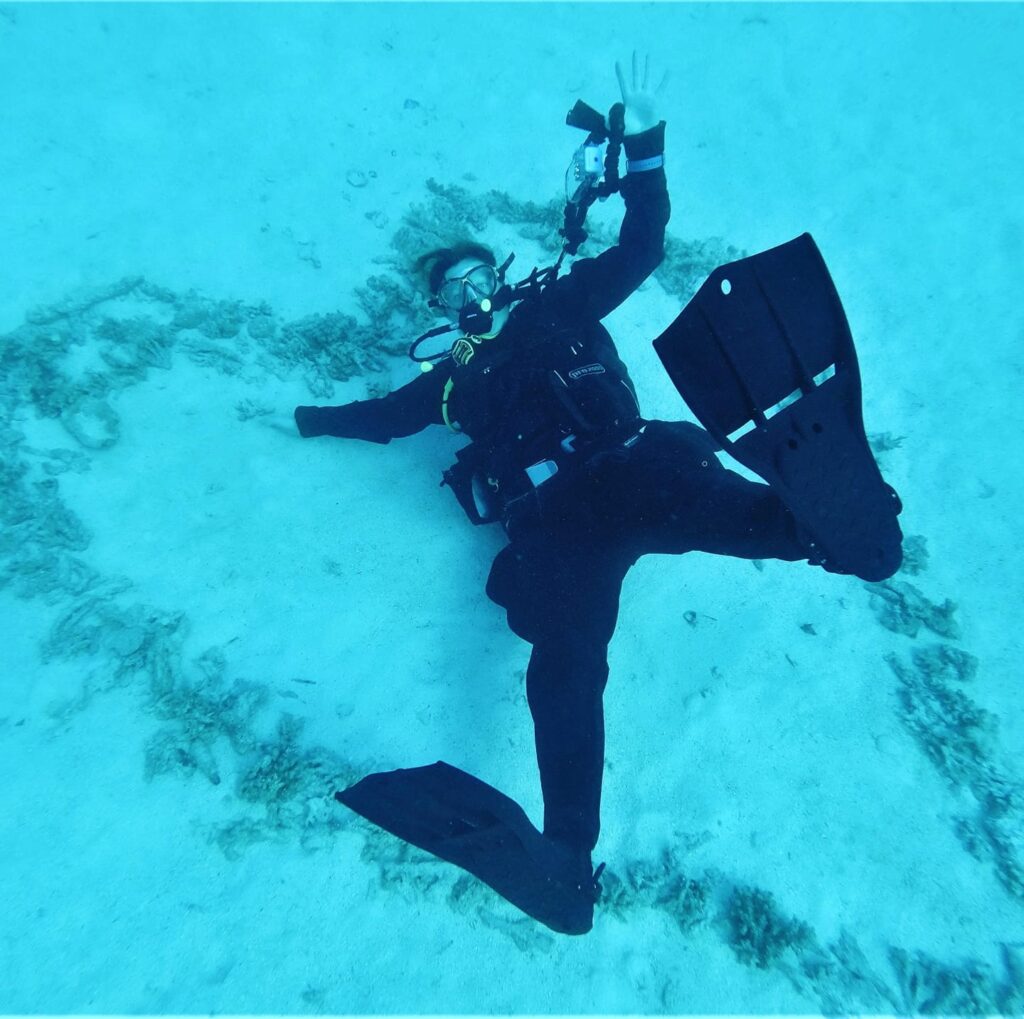
Tell us about yourself!
Growing up in Cawsand, I’ve spent many years on, in, and around the sea. Sailing has played a huge role in my life, especially around Plymouth Sound. When I was 18, I sailed across the Atlantic as part of a professional yacht crew, and since then, I’ve travelled all over the world on various boats. Still, Plymouth Sound remains my favourite place to be. I’ve explored much of its marine environment, both underwater and above, and I take great pride in Plymouth’s nautical heritage.
I hold a degree in Marine and Environmental Science, with a particular interest in marine mammals. I’ve volunteered as a British Divers Marine Life Rescue Medic and helped out at the Cornish Seal Sanctuary in Gweek, Cornwall. My time volunteering with the Cornwall Seal Research Trust focused on Grey Seal Conservation. I was even awarded University of Plymouth Student of the Year for my seal-related research project at Falmouth Marine School, where I worked with the community to raise awareness about issues like plastic pollution.
More recently, I’ve worked in the dive industry with Fourth Element and in public health as a social prescriber, connecting people and communities to their blue and green spaces for better health and wellbeing. I’m passionate about community and committed to enabling as many people as possible to access our amazing marine environment—whether that’s by sitting on the beach, taking a walk to the nearest blue space, or getting people on and in the water.
What attracted you to become a PSNMP Ranger, and what do you love about the job so far?
It’s my dream job! If you look back at all the experiences I have just told you about, especially the fact that I know and love the area so much, it was my playground growing up and I know how lucky I was. I want others to feel the way I do about it.
A highlight is working with communities out in beautiful blue spaces such at Mount Edgcumbe, Mount Batten and on the Hoe. I am also enjoying learning more about areas, especially talking with communities and finding out what they love about Plymouth Sound National Marine Park.
What are you looking forward to within your role?
I am really looking forward to using this amazing opportunity the National Lottery Heritage Fund has given us to deliver an exciting and engaging activity plan across the city, over the next few years and seeing the positive outcomes for the people of Plymouth and their marine environment.
Millie Groom, PSNMP Coastal Ranger
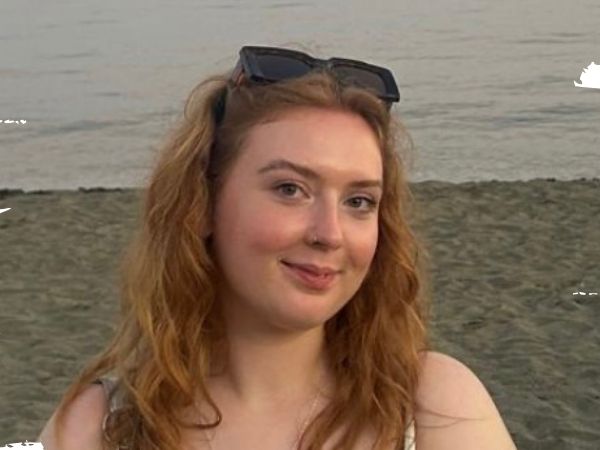
What inspired you to pursue a career in marine science/conservation?
I have always felt connected to the water. Growing up in the North West, I rarely spent time by the sea; but when I did, I felt a strong connection to it. As I grew up and saw the impacts of climate change and the deterioration of our planet, I knew I wanted to protect what I loved so much.
I’ve always been curious as to why people act sustainably and what drives us to feel connected to nature. So, from the age of 14 I signed myself up for work experience placements with environmental organisations in the summer holidays and spent time working with some incredible minds in environmental activism and marine conservation.
This work then led to my choice of University, the University of Plymouth where I studied Environmental Management and Sustainability. It was the perfect place to work in the marine conservation world whilst finally being by the Sea, and I haven’t left since!
What advice would you give to young women looking to enter this field?
Don’t be afraid to ask. Ask for opportunities, ask for support. It can be extremely daunting asking these sorts of questions but if you know you have put the work, time and effort in, ask questions.
Have you had any female role models or mentors who influenced your journey?
My mum and sister have always been my biggest role models. They are strong women who have always worked hard and pushed boundaries. Without them pushing me to speak up and work hard for what I believe in, I probably wouldn’t be in my dream career!
I would say my biggest mentor in my career is Environmental Journalist, Anna Turns. In my second year at Uni, I completed a two-month placement with Anna as an environmental journalism intern. I knew I wanted to learn how to convey my passion for conservation into words and Anna supported me through that, every step of the way. Anna taught me a lot in those few months, she taught me to make yourself known, to work hard and to ask questions. In fact, I landed my internship with her by emailing her asking to be her intern as I admired her work so much. Since then, she has been an amazing mentor who continues to support me to this day!
What’s one thing you wish more people knew about the ocean?
The importance of seaweed! Seaweed is one of the most incredible organisms on our planet. Whilst it gets a bad reputation for its slimy, slippery texture (and can give you a freight when you’re swimming past it!); the benefits it provides our waters with are endless. Not only is it a habitat for countless marine species, but it is also one of nature’s greatest carbon sequestration systems.
What are the biggest challenges facing marine science/conservation today?
People’s disassociation with nature. To enact change in marine conservation, especially within the marine park, we need people to connect. Connect with nature, with each other and with themselves. This connection is often the driving force behind sustainable behaviour. If we feel a connection to our marine spaces, we are more likely to want to look after them and protect them. So, I think that a major challenge within marine conservation is creating opportunities for people to connect with blue spaces and nature as a whole.
Looking at the growth of Plymouth Sound National Marine Park, we want to express our deepest gratitude for their tireless efforts. Their dedication not only inspires us but also reminds us of the power of collective action in protecting our marine environment. If you’re inspired by their stories, consider joining us in our mission. Whether through volunteering, attending our events, or simply spreading awareness about the importance of marine conservation, every action counts. Together, we can ensure that our National Marine Park continues to thrive for generations to come. Thank you to all the women who are making a difference in our community!


